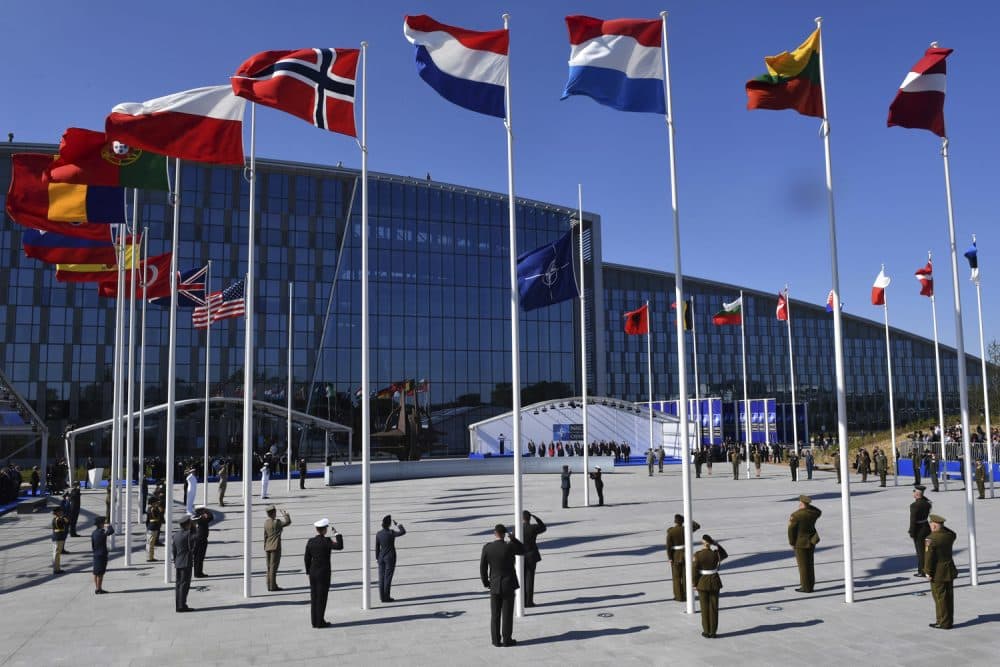Advertisement
An Admiral's Warning On Weakening US Ties With Europe

With all that's going on at home, it can be easy to forget about US relations abroad. But for former NATO top commander Adm. James Stavridis, our alliances overseas are essential to determining our own future.
Today on our show, we spoke with Stavridis. He offered a sobering warning on US relations with Europe under a tumultuous White House. These are highlights from the conversation, lightly edited:
Guest Host Jane Clayson: Based on what you just said I want to play the sound. In his May 25th dress at the NATO headquarters as the heads of state of the member nations looked on, and looking pretty glum, President Trump criticized them for not paying their fair share for the defense umbrella.
President Donald Trump: These grave security concerns are the same reason that I have been very, very direct with Secretary Stoltenberg and members of the alliance in saying that NATO members must finally contribute their fair share and meet their financial obligations. But 23 of the 28 member nations are still not paying what they should be paying and what they're supposed to be paying for their defense.
Guest Host Jane Clayson: And here was German Chancellor Angela Merkel at a campaign event in Munich after she and other NATO leaders including President Trump met in Brussels. She said the conference had changed the way she sees Europe's relationship with the United States. Here's a clip from that speech interpreted by Press TV.
German Chancellor Angela Merkel: The times in which we can fully count on others are somewhat over as I've understood over the past few days. Therefore I can only say that we Europeans must really take our destiny into our own hands. Of course in friendship with the United States and friendship with Great Britain and in good neighborly relations when possible with Russia and other countries. But we should know that we have to fight for our future ourselves.
Guest Host Jane Clayson: Admiral Stavridis, you know, saying Europe will go it alone if we have to. I mean, first of all, what do you make of that?
Adm. James Stavridis: First of all it is a natural, human and political reaction on the part of Angela Merkel. If I can use a nautical metaphor, as the author of a book called 'Sea Power,' I feel Europe drifting away from us. Secondly I think President Trump has deeply offended the Europeans and it's really not about how much they spend on defense at the end of the day. And frankly we spend $600 billion a year. The Europeans spend $300 billion a year on defense. That's more than Russia and China combined. So they might be a bit short in a couple of areas. But broadly speaking they're the second largest defense budget in the world and they're the second most capable military in the world. So to stand in public and insult them as opposed to closing the door, having the conversation, let's get you up to the 2 percent of GDP that's legitimate. It's the style points. It's the the notes of ill and unpleasantry that come across in that conversation. That doesn't help us over the long term. Angela Merkel's reaction fully justified.
Advertisement
Guest Host Jane Clayson: I've written down here in capital letters: 'Europe drifting away from us,' which is what you just said. What are the ramifications of that?
"There can be no more geopolitically tragic event than a cracking, a weakening of the transatlantic bridge."
Adm. James Stavridis: There can be no more geopolitically tragic event than a cracking, a weakening of the transatlantic bridge. Let's kind of do the numbers on NATO quickly. Here are 29 nations — we just added Montenegro — so 29 nations, 52 percent of the world's gross domestic product, 3 million men and women under arms — almost all of them volunteers. Twenty four thousand military aircraft. Eight hundred warships. This is a rich, powerful, cohesive and value-aligned alliance. It is the ultimate force for good in the world. Over time if that European component drifts away because of a lot of churlish behavior on the part of the United States, we will be poorer, we will have less alliance structure to fall back on and the world will be less stable.
Guest Host Jane Clayson: So broad strategic shifts. Do you see those under way or do you just worry about that?
Adm. James Stavridis: I see them underway. And we ought to recognize that almost immediately after Angela Merkel's statement, who arrived in Berlin to enormous acclaim? Deep talks. It was President Xi of China. Like nature, geopolitics abhors a vacuum. The degree to which the United States steps out of the international world will be the degree to which China, at the moment, will step into it.
This segment aired on June 8, 2017.